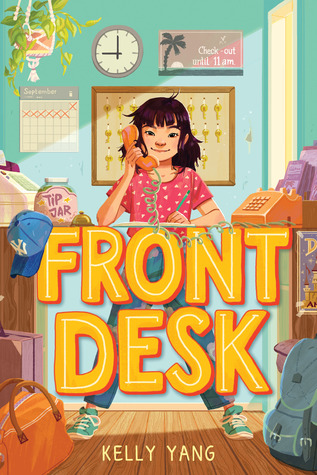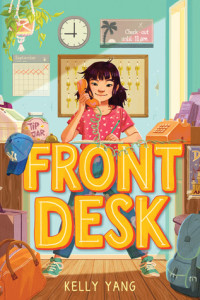This book has been making waves on social media and I knew I had to read it because it had a Chinese protagonist. Besides, the cover art completely sold the book. In it, Mia Tang moves to America from China with her family in the 90s and they have a hard time, to say the least. After her parents are fired from working at a Chinese restaurant, they are employed by Mr Yao, an owner of a motel. While her parents clean the rooms, Mia is in charge of the front desk and has to check in guests. Soon, her parents start hiding illegal immigrants while avoiding being found out by their employer. For Mia, she also has to contend with Mr Yao’s son, Jason, at school as he bullies her to no end.
Warning: Spoilers below.
This book took me on a rollercoaster ride of emotions as it detailed the financial struggle of Mia’s parents and the disappointment that they felt coming to America — what they thought was a land of opportunity turned out to be a place where they were taken advantage of and abused at times. Mia also finds out that Mr Yao essentially went back on his word — instead of giving them a $5 commission on all customers, he changes the terms so that they do not include the first ten visitors and the people who stayed at the motel weekly. There was also the moment where Mia’s father brought her to a fancy stationery store to buy a glittery $5 pen, and the parts where Mia’s mother goes to the shopping mall with her carrying Macy’s bags just to feel like she had obtained a part of the American dream.
Although Mia has to work, she also faces problems at school, especially when Jason, Mr Yao’s son, goes to the same school as her. All throughout the book, he terrorises her. He mocks how poor she is, which motivates her to steal a pair of jeans left behind by a guest’s daughter. The bullying culminates in taking her $5 pen, which he refuses to give back. Mia finds solace in Lupe, who at first pretends to be affluent, but this changes when Lupe’s father, José, comes over to the motel to repair the television. Because of their shared poverty and experience as immigrants, they bond. These experiences are very real and one can imagine lying about being well-off at school, especially when everyone else seems to be.
In addition, what Mia wants is to be a writer and to be good at English since she likes the language. Her mother discourages her and she is further saddened when she gets her writing assignment back, which is filled with red ink and teacher’s notes. But Mia doesn’t give up and practises writing, realising that her improvements in the language and writing will help improve people’s lives as well.
This is seen when one of the motel’s regular residents, Hank, is accused of stealing a car. The police do not believe that he is innocent because he is black, which angers Mia. He also loses his job because of this Through looking at her records of the guests who have checked in, Mia is able to find the culprit who stole the car and exonerate him. However, Mia does more. After learning what a reference letter does, she writes a glowing one for him, lying that he worked as a security guard at a motel, enabling him to get another job as a security guard.
In another incident, Mia hears the story of one of the people who seek refuge at the motel. His passport and visa has been confiscated by his employer to ensure that his employer would not run away. With the help of the adults and a thesaurus, Mia writes a fake lawyer’s letter to that employer and manages to get the man’s passport and visa back.
These incidents examine poverty, immigration and race issues, all of which are deftly handled by the author. All of this is explained it in a simple way without patronising children. Of course, this book has a happy ending. Mia’s hard work at writing pays off and she is asked by her teacher to read her story to the class. Although she does not win an essay writing competition that will enable her to win a motel, she manages to rally the community behind her and purchase the motel she works at so that Mr Yao will not have any more power to oppress them in the future.
What strikes me about this book is that it is hopeful and told with a lot of heart — it shows young children (and even the adults reading this) that no matter what difficulties you face, you can empower yourself with the skills you need to work through them.
I fully recommend this book to everyone.

